In true CinemaSins style: WARNING: SPOILERS. (Duh)
Born in Birmingham in 1924, Anthony John Hancock became, quite simply, the hottest property in British television at the beginning of the 1960s. His radio and television shows had been running since 1954 and frequently attracted audiences in the tens of millions.
Introduced by Angela Morley's iconic tuba motif, "the lad 'imself" was aided and abetted by his frequent bête noir Sidney Balmoral James.
With the deft, skilfully written scripts of Alan Simpson and Ray Galton to guide them, Hancock's Half Hour would go down in history as one of the most successful and culturally significant sitcoms ever.
Yet in February 1960, the quotable classics such as The Blood Donor, The Radio Ham and The Lift were still to be typed out.
In the previous series, Hancock had served on a jury as part of Twelve Angry Men, imploring his fellow deliberators not to let Magna Carta die in vain; Magna Carta apparently being a poor Hungarian peasant girl who "got King John to sign the pledge at Runnymede to close all the boozers at half past ten."
He had also attempted to pass off his semi-detached home - 23 Railway Cuttings, East Cheam - as a former residence of famed poet Lord Alfred Byron - or was it George Gordon Byron? - in order to fund much needed structural renovations. Having managed to flog some questionable merchandise to some clueless Americans, he was promptly found out and shut down by the council.
He finished the year on a gloomy, foggy November evening by attempting to influence a football match - coincidentally featuring East Cheam Utd - in order to win big on the pools. Needless to say the only big numbers Hancock saw that night were the ones next to Chelsea's name on the stadium scoreboard.
Such was the demand for Hancock that the transmission date for the next series was mere weeks away. The concept of pre-recording episodes onto videotape - as opposed to performing them live on the night - was only a few years old at this point. Happily it means most, if not all, of the later series survived the awful, needless culls the BBC did to its archives.
Series 6 began with Tony surviving a vicious bout of man flu before setting off on a quest around London to try and find out who the protagonist of "Lady Don't Fall Backwards" was.
At the beginning of Episode 4 a smartly dressed landlord (Sidney Vivian) is wiping down a bar next to an old-school, Open All Hours-esque till. Behind him are shelves filled with bottles of spirits, some cardboard beer advertisements (sadly near-indecipherable due to the quality of the telerecordings) and, tellingly, a sign saying "Your Empties."
This is an off licence attached to a pub. While other episodes in Hancock canon make reference to a local hostelry called the "Hand and Racquet" it's not explicitly named here. It would eventually be revealed to indeed be the aforementioned establishment in the later audio version released on vinyl record in 1965.
Confirming the setting, our hero tumbles clumsily through a set of frosted glass double doors inscribed with "Off Licence." He is clutching a paper bag full to bursting with empty bottles. It appears to be raining.
As they discuss the weather, we learn the landlord's name is Harry. His familiarity with Tony is such that he addresses him as "Mr H." Hancock's familiarity with Harry is such that he is able to gently tease him that "there's more water out there than there is in your beer."
Harry wouldn't water his beer down, surely?
Apparently the weatherman on telly was sticking little metal clouds all over his map. Following further musings on the plight of fishermen in coastal waters and wondering what "south cones" are, Tony hands over his soggy bag and Harry proceeds to check the contents.
It's a deposit and return system. You get money back if you bring your empties back for the brewery to reuse. What a notion! Why don't they do this nowadays? I mean apart from in Scandinavia? Or Estonia? Or Germany? Or....
It doesn't start well. Harry immediately notices two unlabelled bottles aren't from his pub's brewery. Hancock protests, but it seems that despite his best efforts at anonymising his returns, he left a bit of the label around the stopper. Harry scolds Tony. "'Ellerman & Hunters. We're a Groynley house!" I have yet to find any evidence that these were real breweries although, given that Hancock was a BBC production, it is likely these were fake brands.
Tony's wine and spirit bottles are also ineligible for a refund, but eventually Harry finds a single solitary beer bottle that he can accept, for a grand total of 4p. Passing up Harry's offer of a packet of crisps, Tony sarcastically asks instead for three arrowroot biscuits.
Still peeved, Tony hesitates before disclosing the other purpose of his visit - he's placing an order for an upcoming army reunion party. It is 1960, the 15th anniversary of the end of World War II. Tony's invited three members of the "Third East Cheam Light Horse" round, a triumverate of men who happen to be "three of the biggest drinkers to ever set foot in a pair of army boots."
Hancock's order goes as follows:
- ten crates of Stout Winter Brew
- five crates of Best Brown
- twelve quarts of Dragon's Breath (a name since used by Dartmoor Brewery)
- two barrels of Bitter
- two crates of Danish lager (would this possibly have been Carlsberg?)
- a barrel of rough cider
- three bottles of Harker's Gin
- six bottles of whisk(e)y
- two bottles of Pirate's Pleasure rum
And apparently that's just to clear the dust out of their throat - he's coming back the next evening with the main order. Harry is somewhat taken aback by this revelation.
Having done his business, and with a promise from Harry that "the boy will drop the stuff around the next morning", Hancock once more steps out into the rain, pausing to chat with an incoming customer, proclaiming that the cause of the weather is probably the recent British H bomb tests.
Much to Harry's chagrin, the newcomer - Fred - immediately remarks that "there's more water out there than there is in your beer."
The episode then moves on to the next night, pre-party, where Tony has laid out all his booze on a massive table which takes up front and centre of the screen, an ever present reminder of the festivities along with the obligatory Union Jacks.
Housemate Sidney, having dutifully helped set the room up, attempts to start the party before the guests arrive but Tony is having none of it.
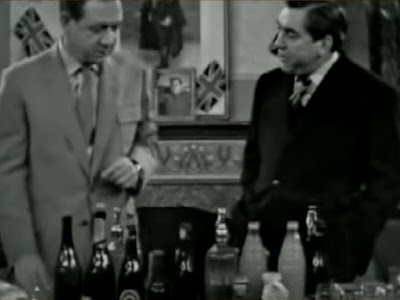

The two proceed to try and one-up each other by swapping a few increasingly dubious and fanciful army stories - turns out Sid served king and country too - before there's a knock on the door. The barrel of cider waits in the corner of the room, taking pride of place. Joyfully, Hancock requests that Sid let them in.
The first guest, played by Hancock's Half Hour stalwart Hugh Lloyd, is "Smudger" Smith, aka the "Avalanche". Only he now prefers to be known as Clarence Smith and has become a respected bank clerk who has all but given up alcohol due to a stomach complaint. However he eventually relents to Hancock's badgering and meekly asks for a small sherry.
Naturally Hancock hasn't got any.
His wife Mavis (Eileen Way), a former member of the Auxilliary Territorial Service who Tony had previously recalled in less than favourable terms, is even more of a staunch teetotaller, actively and vocally disapproving of Sid imbibing "the refreshment of the Devil."
The four then settle down as they have lots to talk about.
As it turns out, "fifteen years....it's a long time."
"Yes, it is."
"Yes, it most certainly is."
This is perhaps the closest the TV series ever got to emulating the classic radio episode Sunday Afternoon at Home where for long periods nothing happens and nobody says anything.
And it's hilarious.
Despite the tensions - and a near fist fight between Sid and Clarence instigated as much to relieve the boredom as anything - things are calmed again before the second guest arrives.
Ginger Johnson's "mop of flaming red hair" has receded somewhat over the years. In reality, under the bald cap is 40-year-old Clive Dunn, here still eight years away from portraying another old warhorse in Dad's Army.
To Tony's pained distress, Ginger proceeds to request a small sherry.

A desperate Tony resorts to his photo album, the more salacious contents of which causes discomfort for the now married and henpecked Smudger - er, Clarence - and disinterest for the short-sighted Ginger.
It's becoming increasingly clear that the only one for whom this evening has any meaning is the host - the others have moved on with their lives and put their wartime experiences and memories firmly behind them. Yet they still turned up at the party out of politeness for their old comrade, but it also seems that merely turning up is as far as they are willing to go.
Tony's mood is lifted slightly by the arrival of the third and final invited guest - Chalky White (Cardew Robinson) whose epithet, thankfully for modern audiences, is not racially motivated. He strides happily and joyfully into the room and greets Tony with enthusiasm and aplomb. Things are looking up. As Chalky moves to one side to take his coat and hat off, Tony confidently predicts that the new arrival will sink all the booze in half an hour.
However it seems that Chalky prefers his wine to be served not from a dining room table in a suburban semi, but in a golden goblet on a Sunday morning. Hancock, finally and utterly defeated, turns to camera, completely crushed.
The episode ends with the guests leaving. Tony bitterly suggests that the next reunion should be round Smudger's place in 1975. Ginger doesn't think it would be worth it, and Chalky blesses Tony's soul. Mavis is handed a bottle of brown ale to wash her hair with.

Defeated, Tony slams the door and remonstrates with Sid about the evening's failure. Sid suggests they both get drunk and proposes a drinking game. Tony proposes a toast. "To absent friends! And may they long stay that way!"
The Reunion Party is a tiny, fascinating time capsule of working-class drinking culture in the 1950s and 60s and offers up tantalising glimpses of how things have changed but also how things have not changed. Despite still being in living memory, that era seems simultaneously far away and alien yet somehow not.
The notion of Off Licences operating out of separate rooms within pubs has all but disappeared; although its spiritual successor - buying cans from craft bars for offsite consumption - is not an unusual occurrence 60 years on.
The similar concept of beer being ordered and delivered from bottle shops or breweries to your home is also something which has been very much in focus given the circumstances of the past two years.
Deposit return schemes somehow fell out of favour as materials became more disposable yet, if you believe certain quarters, they're on their way back to this country sometime soon.
Tied houses sadly haven't gone away yet despite increased pressure from landlords and drinkers alike. However no craft brewer has yet recycled the monikers "Ellerman & Hunter" or "Groynley."
One thing that is clearly out of fashion given the advances in and availability of home refrigeration is the necessity for beer, cider, lager and spirits to be stored and served at room temperature.
Even 600ml brown bottles, once quaint, are now just as ubiquitous as their smaller green cousins.
Everything old is new again.
In real life during WW2, Sidney James, a Jewish native of the British Dominion of South Africa, served with that country's military, gaining the rank of lieutenant. He used his service pay to move to the UK in 1946 where he began his career in entertainment. After working with Tony Hancock, James would go on to great success in the Carry On film series before dying on stage in Sunderland of a heart attack in 1976.
Tony Hancock served in the RAF Regiment but failed his audition for ENSA, the Entertainment National Service Association. His brother, a fully fledged RAF officer, was lost over the Atlantic in 1942.
But even more tragically considering the subject matter of this episode, Tony Hancock was also a chronic alcoholic. The image of a wet and dishevilled Tony Hancock bursting through the door of an off licence clutching a bag full of empty spirit bottles as portrayed in The Reunion Party is quite likely to have been played out in real life.
Had medical knowledge and the diagnostic tools been available, he would almost certainly have been diagnosed as suffering from a bipolar disorder and treatment been proffered.
The illnesses would manifest in numerous self destructive behaviours over the next few years. Series 6 of Hancock's Half Hour - the one featuring The Reunion Party - would be his last working with Sid James, and the next one would be his last working with Galton and Simpson. Numerous futile and fruitless attempts to recapture the magic of his glory years would culminate in his untimely suicide in Australia in 1968 at the horribly young age of 44.
The old adage that the candle that burns twice as bright burns half as long could have been written for Tony Hancock. The amount of pleasure he gave millions of radio listeners and TV viewers was only equalled by the amount of pain he inflicted needlessly upon himself. I fell in love with him at the age of 12 and I have watched and rewatched every surviving episode countless times.
Friday 25th March 2022 is the 62nd anniversary of the first showing of The Reunion Party on BBC TV. It - and the rest of the Hancock oeuvre - is as funny today as it was then. New generations continue to discover it.
Everything old is new again.


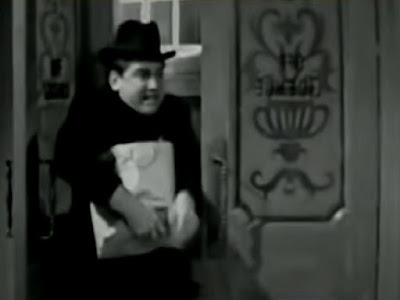
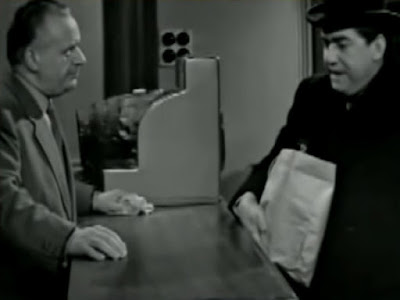


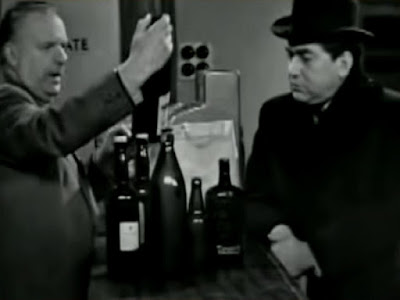
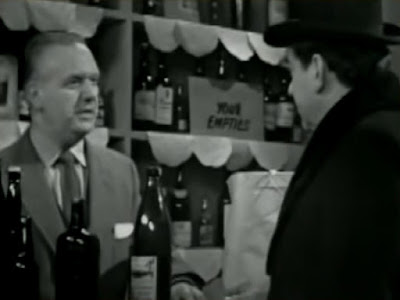





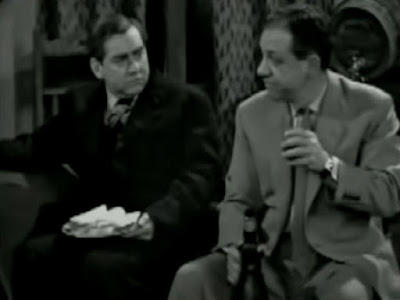
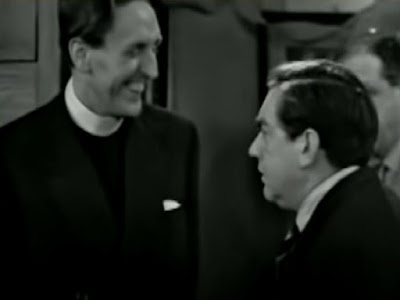


No comments:
Post a Comment